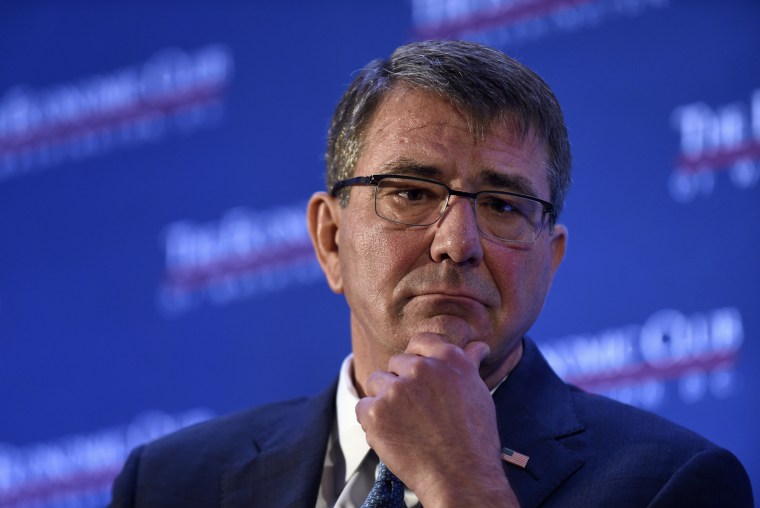Defense Secretary Ash Carter told lawmakers on Thursday that the hundreds of military personnel being sent to Iraq and Syria to support efforts to defeat ISIS are 'in combat".
"These people are in combat ... and I think we need to say that clearly," Carter said.
Earlier this week, President Obama announced the U.S. will send an additional 250 military personnel to Syria which will reinforce the contingent of around 50 commandos authorized for operations in Syria.The U.S. will send an additional 200 troops, including additional special operations forces, to Iraq to assist in training and advising, the Pentagon announced earlier this month.
Related: U.S. to Send 200 More Troops to Beat ISIS in Iraq, Ashton Carter Says
Last June, President Obama announced the military would send hundreds of military personnel to train Iraqi troops in Anbar province. An additional 3,000 Americans were already on the ground in advisory and training roles.
Related: Ashton Carter: U.S. to Begin 'Direct Action on the Ground' in Iraq, Syria
The White House, acknowledges that the military personnel will be in harm's way, has been reluctant to say that they will be in combat.
"They're not in a combat role, but they are in a role that puts them in harm's way," White House press secretary Josh Earnest told reporters on Tuesday in response to a question about sending more military personnel to Syria. "They are armed for combat. They are armed to defend themselves if necessary. But the role that they have is to offer advice and assistance to forces on the ground fighting ISIL in their own country. And that has proved to be a valuable tool and one that the president is seeking to intensify."
Throughout the hearing, Carter defended the U.S. strategy for defeating Islamic State militants, telling lawmakers that U.S.-backed local forces in Iraq and Syria are making substantive gains toward retaking the extremist group's strongholds.
Carter counseled against sending a large, American-led "foreign ground force" to battle the Islamic State. Such a move would play into the hands of the extremists, he said, "fighting on the enemy's terms of ground combat amid a local population that has previously responded violently to such an approach."
But the Republican chairman of the Senate Armed Services Committee, Sen. John McCain of Arizona, criticized the Obama administration's approach in Iraq and Syria as reactive, slow, and insufficient. McCain also said military operations in both countries are being micromanaged by officials in Washington, which is causing them to lose sight of the larger strategic picture.
Related: DoD Walks Back Sec. Carter's Claim on Surrounding Mosul before Ramadan
"Put simply, too many of our leaders appear involved in the tactical fight ... and not enough in the strategic fight," McCain said. "And despite the real tactical gains we have made, we must ask ourselves: Is this working? Are we winning? Are we getting ahead of the threats and problems we face? Or are they getting ahead of us?"
Carter and Marine Corps Gen. Joseph Dunford, the chairman of the Joint Chiefs of Staff, said U.S. cyberattacks against the Islamic State are continuing and aim to disrupt the group's financial support and recruiting abilities.
"The objectives there are to interrupt (the Islamic State's) command and control, interrupt its ability to move money around, interrupt its ability to tyrannize and control population, interrupt its ability to recruit externally," Carter said.
The overall goal, Dunford added, is to put the extremists in "virtual isolation."

